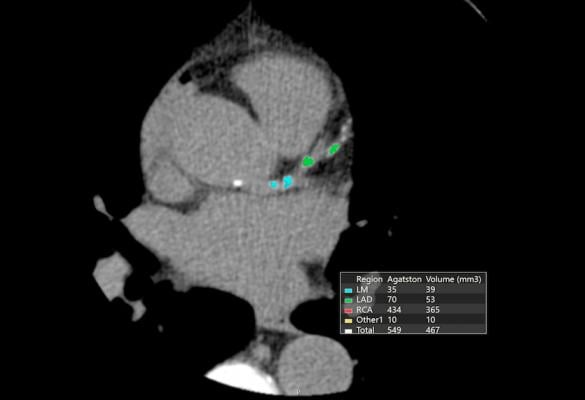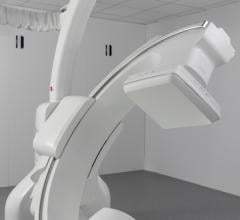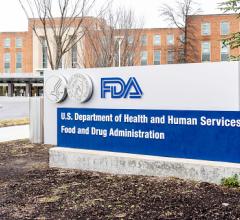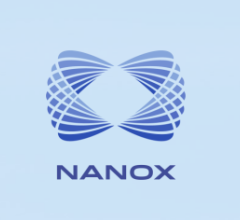
An example of a CT coronary artery calcium scoring exam showing how each vessel segment is scored to assess a patient's risk for a future heart attack. Example is from Canon Medical Systems.
September 25, 2020 — A study out of University Hospitals (UH) found that removing the cost barrier for coronary artery calcium (CAC) computed tomography (CT) imsging screening resulted in an immediate increase in utilization of the test. Furthermore, no-charge calcium screening was associated with an increase in representation by women, minorities and people living in ZIP codes with lower income. These findings strongly suggest that removing the cost burden will result in widespread use of CAC screening for cardiovascular risk assessment, especially in traditionally underserved groups.
Cardiovascular disease is the leading cause of death in the United States for both men and women. Every 40 seconds someone in America has a heart attack. CAC testing provides crucial information, measuring the amount of calcium that has accumulated in the walls of the coronary arteries as a surrogate for atherosclerosis, the process that results in a heart attack. A person’s calcium score is highly correlated with cardiovascular death and the chances of having a heart attack or stroke, with the higher scores representing a greater risk for subsequent events in the coming years. For example, a CAC score of greater than 400 is found in approximately 10% of those screened and is associated with a 10-year risk of heart attack, stroke or death of 25%.
Although CAC screening provides vital health information, it is generally not covered by insurance and can cost from $400 to $800. UH Harrington Heart & Vascular Institute began a system-wide low-charge ($99 per test) CAC program in 2014 and fully implemented no-cost CAC screening for all patients in January 2017.
“University Hospitals chose to offer no-cost calcium scoring as a benefit to the people of Northeast Ohio,” said Dan Simon, M.D., UH chief clinical and scientific officer and president, UH Cleveland Medical Center. “As part of our mission to heal, UH has implemented programs to address health care disparities for underserved populations. Making this screening no-cost improves access for everyone, but especially minorities and those with lower incomes.”
The paper, "No-Charge Coronary Artery Calcium Screening for Cardiovascular Risk Assessment," was published online last month in the Journal of the American College of Cardiology.[1] It details the study, which looked at a total of 27,466 patients: 5,109 in the low-charge phase and 22,357 in no-charge phase. The study found implementing no-charge CAC screening resulted in an immediate increase in utilization with an average monthly increase of 546 percent. The no-charge CAC program also was associated with increased age (57.9 vs 59.3 years), more women (46% vs 51%) and more Black patients (7.2% vs 9.4%).
“This study shows what we hoped would be the case: more patients undergo testing when that testing comes at no cost to them,” said Sanjay Rajagopalan, M.D., chief, division of cardiovascular medicine. “The fact that more people, especially women and socioeconomically disadvantaged segments, utilize this test at no cost is very meaningful. Women for instance are considered low risk, but up to a third of female patients had presence of CAC with heightened atherosclerotic cardiovascular disease risk.”
Arming patients with this information does make a difference. Studies on CAC score have reported that people who were informed they had high calcium levels made positive changes including adherence to statins and aspirin, as well as improvement in diet and exercise.
Undergoing a CAC screening is not invasive or time-consuming for the patient. An appointment takes less than 30 minutes from start to finish, including the scan, which actually takes less than 1 minute. CAC scoring requires a similar amount of radiation as a screening mammogram, but is performed only once every 5 to 10 years compared to annual mammography. The CT scan is performed without an intravenous line or contrast. This study shows that when hospitals empower patients to take charge of their health, good things happen.
Related Calcium Scoring Content:
How the Agatston Calcium Score Was Created and its Impact on Heart Attack Prevention
VIDEO: The History of CT Calcium Scoring — Interview with Arthur Agatston, M.D.
VIDEO: New Cholesterol Guidelines Support CT Calcium Scoring for Risk Assessment — Interview with Matthew Budoff, M.D.
CT Scan For Arterial Plaque is Better at Predicting Heart Attack Than Stroke
Reference:


 February 13, 2026
February 13, 2026 









